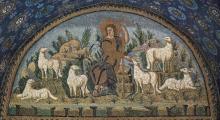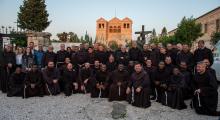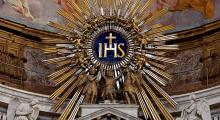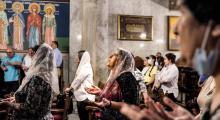Issued by the Catholic Center for Studies and Media - Jordan. Editor-in-chief Fr. Rif'at Bader - موقع أبونا abouna.org
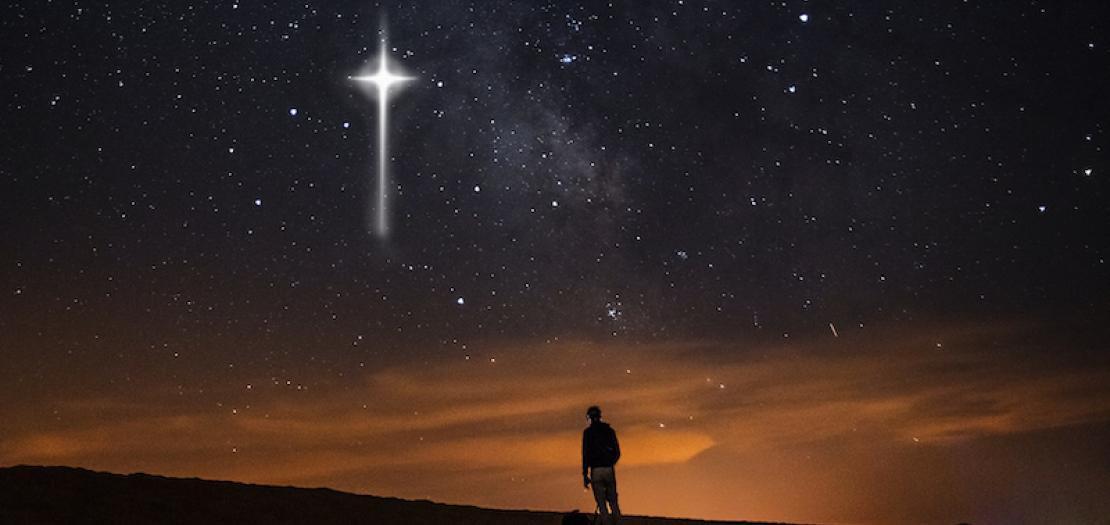
We saw the star in the East, and we came to worship him (Mt 2:2) According to the Gospel of Matthew (2:1-12), the appearance of the star in the sky of Judea represents a long-awaited sign of hope, that leads the Magi, and indeed all peoples of the earth, to the place where the true king and Savior is revealed. This star is a gift, an indication of God’s loving presence for all humanity. To the Magi it was a sign that a king was born. With its rays, it leads humanity towards a greater light, Jesus, the new light who enlightens every person and who leads us into the glory of the Father and the splendor of his radiance. Jesus is the light who has come into our darkness when, by the Holy Spirit, he was incarnate of the Virgin Mary and became human. Jesus is the light who went even further into the darkness of the world when for our sake and for our salvation, he emptied himself and became obedient unto death. He did this to light our way to the Father, so that we might come to know the Father and know the love he has for us, who gave his only Son for us, so that believing in him we might not perish but have eternal life.
The Magi saw the star and followed it. Traditionally commentators have seen in the figures of the Magi a symbol of the diversity of peoples known at that time, and a sign of the universality of the divine call which appears in the light of the star shining from the east. They also see in the Magi’s eager search for the new-born king, all humanity’s hunger for truth, for goodness and for beauty. Humanity has been longing for God since the beginning of creation in order to give him homage. The star appeared as the divine child was born in the fullness of time. It heralded God’s long-awaited act of salvation which begins in the mystery of the incarnation.
The Magi reveal to us the unity of all nations desired by God. They travel from far-off countries, and represent diverse cultures, yet they are driven by the same hunger to see and know the new-born king, and are gathered into the little house in Bethlehem in the simple act of giving homage and offering gifts. Christians are called to be a sign to the world of God bringing about this unity that he desires. Drawn from different cultures, races and languages, Christians share in a common search for Christ and a common desire to worship him. The mission of the Christian people, therefore, is to be a sign like the star, to guide humanity in its hunger for God, to lead all to Christ, and to be the means by which God is bringing about the unity of all peoples.
Part of the Magi’s act of homage is to open their treasures, to offer their gifts, which from Christian antiquity, have been understood as signs of different aspects of Christ’s identity: gold for his royalty; incense for his divinity; and myrrh foreshadowing his death. The diverse gifts, therefore, provide us with an image of the particular insights that different Christian traditions have into the person and work of Jesus. When Christians gather together and open their treasures and their hearts in homage to Christ, all are enriched as the gifts of these insights are shared.
The star rose in the east (Mt 2:2). It is from the east that the sun rises, and from what is called the Middle East that salvation appeared by the mercy of our God who blessed us with the dawn from on high (Lk 1:78). But the history of the Middle East was, and still is, characterized by conflict and strife, tainted with blood and darkened by injustice and oppression. Most recently, since the Palestinian Nakba (the exodus of Palestine’s Arab population during the 1948 war) the region has seen a series of bloody wars and revolutions and the rise of religious extremism. The story of the Magi also contains many dark elements, most particularly Herod’s despotic orders to massacre all the children around Bethlehem who were less than two years old (Mt 2:16-18). The cruelty of these narratives resonates with the long history and difficult present of the Middle East.
It was in the Middle East that the Word of God took root and bore fruit: thirty and sixty and one hundredfold. And from this east that the apostles set out to preach the Gospel to the ends of the earth (Acts 1:8). The Middle East gave thousands of Christian witnesses and thousands of Christian martyrs. And yet now, the very existence of the small Christian community is threatened as many are driven to seek a more secure and serene life elsewhere. Like the light which is the child Jesus, the light of Middle Eastern Christianity is increasingly threatened in these difficult times. Jerusalem is a powerful symbol for Christians because it is the city of peace where all humanity was saved and redeemed. But today peace is missing from the city. Various parties stake their claim to it and disregard others. Even prayer in Jerusalem has become subject to political and military measures.
Jerusalem was the city of kings, indeed the city that Jesus will enter triumphantly, acclaimed as king (Lk 19:28-44). Naturally the Magi expected to find the new born king revealed by the star in this royal city. However, the narrative tells us that, rather than being blessed by the birth of the Savior King, the whole of Jerusalem was in tumult, much as it is today.
Today, more than ever, the Middle East needs a heavenly light to accompany its people. The star of Bethlehem is a sign that God walks with His people, feels their pain, hears their cries, and shows them compassion. It reassures us that though circumstances change and terrible disasters may happen, God’s faithfulness is unfailing. The Lord neither slumbers nor sleeps. He walks beside his people and brings them back when they are lost or in danger. The journey of faith is this walking with God who always watches over his people and who guides us in the complex paths of history and life.
For this Week of Prayer, the Christians of the Middle East chose the theme of the star that rose in the east for a number of reasons. While many Western Christians celebrate Christmas, the more ancient feast, and still the principal feast of many Eastern Christians, is the epiphany when God’s salvation is revealed to the nations in 7 Bethlehem and at the Jordan. This focus on the theophany (the manifestation) is, in a sense, a treasure which Christians of the Middle East can offer to their brothers and sisters around the world.
The star leads the Magi through the tumult of Jerusalem where Herod plots the murder of innocent life. Still today, and in various parts of the world, innocents suffer violence and the threat of violence, and young families flee tyrants such as Herod and Augustus. In this context people look for a sign that God is with them. They seek the new-born king, the king of gentleness, peace and love. But where is the star that leads the way to Him? It is the mission of the Church to be the star that lights the way to Christ who is the light of the world. By being such a star the Church becomes a sign of hope in a world of troubles and a sign of God’s presence with his people, accompanying them through the difficulties of life. By word and through action Christians are called to light the way so that Christ might be revealed, once again, to the nations. But the divisions between us dim the light of Christian witness and obscure the way, preventing others from finding their way to Christ. Conversely, Christians united in their worship of Christ, and opening their treasures in an exchange of gifts, become a sign of the unity that God desires for all of his creation.
The Christians of the Middle East offer these resources for the Week of Prayer for Christian Unity conscious that the world shares many of the travails and difficulties that they experience, and yearns for a light to lead the way to the Saviour who can overcome darkness. The COVID-19 global pandemic, the ensuing economic crisis, and the failure of political, economic and social structures to protect the weakest and most vulnerable, have underlined the global need for a light to shine in the darkness. The star that shone in the east, the Middle East, two thousand years ago still calls us to the manger, to where Christ is born. It draws us to where the Spirit of God is alive and active, to the reality of our baptism, and to the transformation of our hearts.
After encountering the Savior and worshiping him together, the Magi return to their countries by a different way, having been warned in a dream. Similarly, the communion we share in our prayer together must inspire us to return to our lives, our churches and our world by new ways. Travelling by new ways is an invitation to repentance and renewal in our personal lives, in our churches and in our societies. Following Christ is our new path, and in a volatile and changing world Christians must remain as fixed and determined as the constellations and the shining planets. But what does this mean in practice? Serving the Gospel today requires a commitment to defending human dignity, especially in the poorest, the weakest and those marginalized. It requires from the churches transparency and accountability in dealing with the world, and with each other. This means churches need to cooperate to provide relief to the afflicted, to welcome the displaced, to relieve the burdened, and to build a just and honest society. This is a call for churches to work together so that young people can build a future that accords to God’s heart, a future in which all human beings can experience life, peace, justice, and love. The new way between the churches is the way of visible unity that we sacrificially seek with courage and audacity so that, day after day, “God may be all in all (1 Cor: 15:28)



